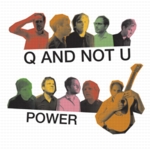|
|
 |
Dusted Reviews
Artist: Q and Not U Album: Power Label: Dischord Review date: Oct. 28, 2004 |

|
|
|
 |
A few questions that came up while listening to Q and Not U's Power: If a band supposedly evolves throughout the course of its first few albums, is there a ballpark figure for how many albums we need to listen to before we can say that they've settled on a distinctive sound? Does the third or fourth album always mark the terminus of their development? Does every change in style represent progress? Need we endorse a Whig theory of musical history under which every album is a step forward – or an evolutionary "misstep" – until the band hits a middle period and we begin to see diminishing returns?
Common reactions to Power seems to hinge on some of these assumptions. On 2000's No Kill No Beep Beep and 2002's Different Damage, Q and Not U sounded like a more agile version of Fugazi, keeping the kinetic rhythm but replacing the ponderous vocals with off-the-wall free associated couplets. Writers, while generally positive, were also positively psychoanalytical when considering Q and Not U's future. Could they overcome Fugazi's influence? Where were they headed with this? Rather than simply praising two excellent albums, reviewers were also anticipating some future breakthrough. Along comes Power, a breakthrough, supposedly, insofar as it's a dance album: different, and thus a step forward.
Q and Not U has always had subtle dance influences, but on the first two albums they were evident mainly in the rhythm section, and at any rate subdued by the guitars. On Power those influences are hardly subtle. Three of the first five songs have falsetto vocals. Four of those first five songs prominently feature the synthesizer, making use of presets to create a pulsing breakbeat. The guitars play percussive arpeggios in an effort to be complimentary (the dissonance of earlier albums is all but gone). It's a style that's daring in particular and predictable in general. In an effort to unpack that sentence: Q and Not U certainly qualifies as the most danceable band on the roster of Dischord Records. Although concerns about branding probably do not trouble the folks at Dischord, recording this type of album for a label so frequently associated with punk and post-punk might just be a daring and creative move. Generally, though, such a judgment turns a deaf ear toward much of what's going on in popular music in 2004. We can see Power as a breakthrough provided that we do not think about the DFA, !!! or Out Hud, or Les Savy Fav.
Unfortunately, Q and Not U do not have much to add to what those bands have already done. Most of their songs run out of steam after three minutes and lack even the slightest hint of volatility. Without the intensity and unpredictability of Les Savy Fav or even epic running time working in their favor, it all turns very pleasant and indistinguishable. "Danceability," alas, has never been a particularly reliable indication of quality. (Witness the decades of jokes at the expense of American Bandstand's oft-rendered judgment that it has a good beat, and you can dance to it.) If we restrict ourselves to that single criterion, I suppose Power is a successful album. That, however, is a true instance of damning with faint praise.
The two best songs, actually, are holdovers from last year's X-Polynation single, "X-Polynation" and "Book of Flags," both of which put the toy whistles and synthesizer presets amidst the angular chaos that marked No Kill No Beep Beep. I know that saying that breaks the narrative arc of Q and Not U's career – replacing it with the cranky critical judgment that this band was so much better two years ago – but I'm not particularly concerned. Both verdicts are clichés, but one of them happens to be true.
By Tom Zimpleman
|







